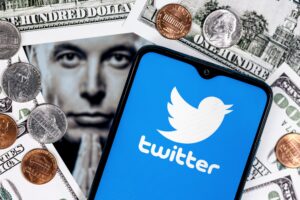
Elon Musk has offered to buy Twitter for $44 billion, a purchase that would put him in charge of one of the most influential media platforms.
The world’s richest person made the offer yesterday, after spending months trying to get out of the deal. If it goes ahead it will raise questions about the future of Twitter, which Musk, who has 107.8 million followers, has said he will make more free-speech orientated.
He has said he will reinstate Donald Trump’s account, calling the ban “flat-out stupid”.
Last night Musk tweeted: “Buying Twitter is an accelerant to creating X, the everything app.”
Musk, 51, and Twitter had been heading to court in Delaware on October 17. Twitter was trying to force the Tesla chief to go ahead with a bid he made in April of $54.20 per share, or $44 billion.
Twitter confirmed last night that it had received a letter from Musk. “The intention . . . is to close the transaction at $54.20 per share,” it said. It is thought the company plans to accept the offer but is waiting for confirmation that a judge can oversee the process.
Twitter shares were up 21 per cent on the news, which caught Twitter employees by surprise. Rumman Chowdhury, its director of machine-learning ethics, transparency and accountability, tweeted: “I am sitting on 2023 company-wide strategy readouts and I guess we are going to collectively ignore what’s going on.”
The future of Parag Agrawal, Twitter’s chief executive officer, is uncertain, given that Musk has said he has no faith in the company’s management. However, if he is sacked within 12 months, Agrawal could be in line for a $42 million payout, according to one estimate.
Musk had agreed, without due diligence, to buy Twitter but said within weeks that the number of “bot” or spam accounts was far higher than Twitter’s estimate of less than 5 per cent. He argued that this made the company less valuable, negating the deal. He was also seeking to use in court claims from an executive turned whistleblower who said Twitter had misled regulators about its security practices.
Musk’s plans have been opposed by many employees and influential users of Twitter, which has 200 million daily active users. He told investors that by 2025 he could get 500 million daily users and revenue of $13.2 billion.
Eric Talley, a law professor at Columbia University, said he was not surprised by Musk’s U-turn. “On the legal merits, his case didn’t look that strong,” he said. “It kind of seemed like a pretty simple buyer’s remorse case.”
Daniel Ives, an analyst at Wedbush Securities, said: “Being forced to do the deal after a long and ugly court battle in Delaware was not an ideal scenario.
“We see minimal regulatory risk in this deal . . . This is a smart move for Musk to go ahead with the deal, given the legal hurdles that were ahead.”
Read more:
Elon Musk to buy Twitter for original offer of $44bn after dramatic u-turn






